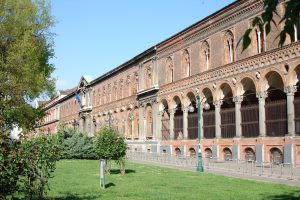
University of Pisa
The University of Pisa was founded in 1343, making it one of the oldest universities in Italy and Europe, It has a storied history, with many significant events and figures associated with it over the centuries. One of the university’s most famous early scholars was the renowned astronomer and physicist Galileo Galilei, who studied and taught at Pisa in the early 1600s, The university has maintained many longstanding traditions, such as its annual graduation ceremony held in the Duomo di Pisa.
Throughout its history, the university has played an important role in the intellectual and cultural life of Pisa and the surrounding region. It’s one of the top universities in Italy and Europe, consistently ranking among the top 500 universities worldwide. It has around 50,000 students enrolled across its various academic departments and programs.
The university is organized into 20 departments covering a wide range of disciplines including science, engineering, medicine, law, economics, and the humanities. Some of its most renowned academic programs are in fields like mathematics, physics, computer science, medicine, and engineering.
The University of Pisa is particularly known for its contributions to the development of modern physics, with famous scientists like Galileo Galilei, Enrico Fermi, and Antonio Pacinotti having been associated with the university
Research
Research is a major priority at the University of Pisa, with academics conducting cutting-edge work across diverse fields, Some Key research areas include nanotechnology, astrophysics, neuroscience, sustainable energy, and many others.
The university operates numerous specialized research centers and laboratories to support its scholarly activities.Pisa researchers have significantly contributed to advancing knowledge and driving innovation, with many impactful publications and patents.The university has strong partnerships with industry, government, and other academic institutions to facilitate the translation of research into real-world applications.
Research Areas and Centers
The university has established numerous specialized research centers and institutes that bring together experts from different disciplines.
Some of the major research areas include nanotechnology, quantum computing, renewable energy, neuroscience, astrophysics, and biomedical engineering. The university operates cutting-edge laboratories and facilities to support advanced research in these domains. Interdisciplinary collaboration is strongly encouraged, with researchers working across departmental boundaries.
Notable Research Achievements
Pisa researchers have made significant contributions to advancing scientific knowledge and driving technological innovations.
For example, the university is at the forefront of research into quantum computing, with breakthroughs in areas like quantum cryptography and quantum sensors. The university’s work on renewable energy technologies, such as solar cells and biofuels, has had important real-world applications.
In the medical field, Pisa researchers have pioneered new techniques in areas like neurosurgery, regenerative medicine, and personalized cancer treatments. The university’s astrophysicists have played key roles in major space exploration projects and the search for dark matter.
Industry Partnerships and Technology Transfer:
The University of Pisa has established strong partnerships with local, national, and international companies to facilitate the translation of research into commercial applications.
These collaborations allow for the co-development of new technologies, products, and services that benefit society. The university has a dedicated technology transfer office that supports the patenting and licensing of intellectual property generated by its researchers. Many spinoff companies have been founded by Pisa researchers, further driving innovation and economic development in the region.
Research Funding and Reputation
The University of Pisa secures significant research funding from national and international sources, including government agencies, the European Union, and private foundations.
Its researchers are highly successful in obtaining competitive grants and awards, further bolstering the university’s reputation for excellence.
The quality and impact of the university’s research output is reflected in its strong performance in global university rankings, where it consistently ranks among the top institutions. Pisa’s research prowess attracts top scholars and students from around the world, contributing to its vibrant intellectual community.
Campus and facilities
The main historic campus is located in the heart of Pisa, featuring beautiful medieval and Renaissance architecture. There are additional campuses and facilities distributed throughout the Pisa metropolitan area to accommodate the large student population.
Campus amenities include libraries, laboratories, sports facilities, and student housing. The historic main campus in central Pisa provides a unique and picturesque setting for students, with its medieval and renaissance architecture.
Beyond the main campus, the university has expanded to include modern facilities and infrastructure across the Pisa metropolitan area. Students can access a wide range of amenities and resources, including libraries, computer labs, sports facilities, cultural centers, and student housing.
The university encourages an active student life, with over 100 student-run clubs and organizations covering academic, cultural, social, and recreational interests. Pisa’s vibrant city life and proximity to other parts of Tuscany offer students abundant opportunities for exploration and leisure outside of their studies.
The availability of English-taught programs and courses at the University of Pisa has made it an increasingly attractive destination for international students seeking a high-quality education in Italy. The university continues to expand its English-medium offerings to cater to the growing global demand.
The availability of English-taught programs and courses at the University of Pisa has made it an increasingly attractive destination for international students seeking a high-quality education in Italy. The university continues to expand its English-medium offerings to cater to the growing global demand.
General Admission Requirements
- Applicants must hold a valid high school diploma or equivalent qualification recognized for admission to university-level studies.
- Depending on the program, students may need to meet specific subject or grade requirements in their prior education.
- All applicants must demonstrate proficiency in the English language, either through a recognized test score (e.g., TOEFL, IELTS) or through previous studies conducted in English.
Undergraduate Admission
- For bachelor’s degree programs, applicants typically need to submit their high school transcripts, a statement of purpose, and any other program-specific requirements.
- Some programs may require students to take an entrance exam or attend an interview as part of the selection process.
- The university considers factors like academic performance, extracurricular activities, and personal motivation during the admissions evaluation.
Graduate Admission
- Admission to master’s degree programs generally requires a bachelor’s degree (or equivalent) in a relevant field.
- Applicants must submit their academic transcripts, a statement of purpose, letters of recommendation, and any other program-specific documents.
- Many graduate programs also consider the applicant’s research experience, professional background, and their fit with the program’s focus.


